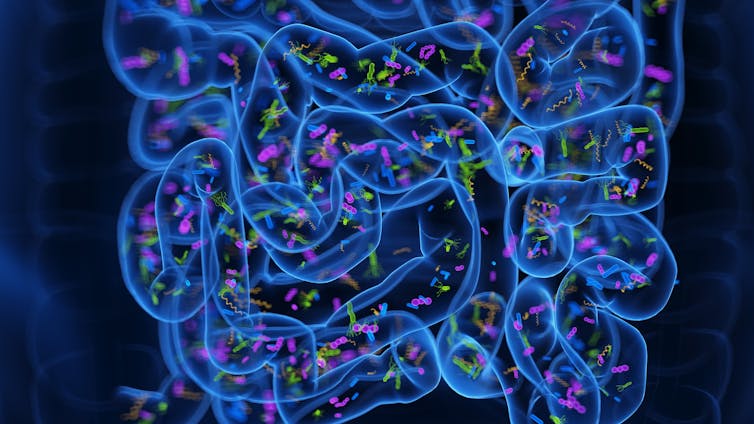
In our fast-paced world, convenience can often come at the cost of nutrition. This shift has led to an increased reliance on ultra-processed foods.
But diets high in ultra-processed foods are increasingly being linked to numerous health issues – including obesity, metabolic syndrome and cardiovascular diseases. The poor nutritional profile of ultra-processed foods, which often lack essential nutrients and fibre, plays a significant role in these health risks.
There’s also growing evidence that ultra-processed foods may affect how our immune system works. This may explain why some studies have linked ultra-processed foods with inflammatory bowel disease and potentially autoimmune diseases.
Ultra-processed foods (such as packaged snacks, sugary drinks, instant noodles and ready-to-eat meals) often contain emulsifiers, microparticles (such as titanium dioxide), thickeners, stabilisers, flavours and colourants. While research on humans is limited, studies on mice have shown that these ingredients alter the gut microbiome (the community of microorganisms living in the intestines) in several ways. These many microbiome changes can in turn affect the way the immune system functions.
The microbiome and the immune system
Studies on mice have shown exposure to low concentrations of emulsifiers can weaken the gut’s mucus barrier. This can make it easier for microbes (including harmful ones) to cross in and out of the gut. Changes in the mucus barrier’s integrity also correlated with higher levels of inflammatory markers. These are signs the body’s immune system is activated.
The lack of fibre typical of diets high in ultra-processed foods may also affect the gut barrier’s integrity. The gut’s microbes need to digest fibre in order to produce short-chain fatty acids. These molecules help maintain the integrity of the intestinal barrier and regulate immune responses by dampening inflammation and helping produce T cells – a type of immune cell that attacks pathogens. Without these molecules, the integrity of the intestinal barrier may weaken and inflammation may increase.
Ultra-processed foods are also linked to changes in the gut microbiome’s composition. Diets high in saturated fats, sugars, salt and additives (such as emulsifiers) have all been shown to decrease the abundance of beneficial bacteria that help maintain the gut barrier in mice. There was also an increase in harmful bacteria that triggered inflammation.

Additionally, ultra-processed foods can turn on harmful genes in normally benign gut bacteria. This could potentially lead to chronic inflammation.
Real-world evidence
Observational studies in humans appear to support these findings.
Research has shown a link between diets high in ultra-processed foods and signs of systemic inflammation, changes in gut microbiome diversity, increased production of gut molecules that cause inflammation and decreased production of beneficial short-chain fatty acids.
For example, one trial showed that a diet high in ultra-processed foods led to higher calorie intake and weight gain compared to a diet without any ultra-processed foods that was matched for calories and sodium levels. Over time, highly ultra-processed diets may contribute to obesity and chronic inflammation. Both factors are closely linked to alterations in the gut microbiome – including decreased microbial diversity and increased gut permeability – which may subsequently affect immune function.
Other research has shown that consuming a lot of salt – common in ultra-processed foods – can increase the number of T cells the body generates, which may increase inflammation. A high-salt diet was also linked with lower levels of beneficial Lactobacillus bacteria in the gut. These bacteria help maintain good gut health by inhibiting harmful bacteria and supporting the gut barrier.
Read more: Gut microbiome: meet Lactobacillus acidophilus – the gut health superhero
Another study found that when people avoided ultra-processed foods, they had significantly lower levels of systemic inflammation and a healthier gut microbiome compared to when they were following their usual diet. It’s not clear how many ultra-processed foods their normal diets included, however.
It’s important to note that these are observational studies, which can only show a correlation and cannot prove causation. There may very well be other factors (aside from diet) influencing these findings.
More research is needed to fully elucidate why ultra-processed foods are so harmful. But the current evidence linking ultra-processed foods to poor health, particularly concerning gut health and immune function, is compelling. As ultra-processed foods become a more significant part of global diets, understanding how they affect our health is crucial.
The authors do not work for, consult, own shares in or receive funding from any company or organisation that would benefit from this article, and have disclosed no relevant affiliations beyond their academic appointment.
This article was originally published on The Conversation. Read the original article.







